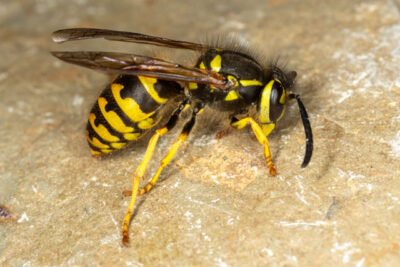Wasps getting hungry and aggressive
By Al Beeber - Lethbridge Herald on September 10, 2024.
 Scientist Dan Johnson says early season moisture got wasps off to a slow start. "They're running out of food and they're desperate. And they're trying to provision great big hives and they're aggressive," he says. - Photo courtesy Dan Johnson
Scientist Dan Johnson says early season moisture got wasps off to a slow start. "They're running out of food and they're desperate. And they're trying to provision great big hives and they're aggressive," he says. - Photo courtesy Dan JohnsonLETHBRIDGE HERALDabeeber@lethbridgeherald.com
They’re hangry and everybody it seems well aware of that.
Wasps are everywhere and their aggressiveness is being driven by heat and hunger, says University of Lethbridge professor and scientist Dan Johnson.
And they’re going to be around southern Alberta for awhile with continued warm temperatures in the immediate forecast.
“There are more and they’re more active,” said Johnson.
Moisture earlier in the year impacted wasps and other insects which got off to a slow start. Then with heat and food availability, “they really picked up,” said Johnson.
A mated queen will overwinter alone. She’ll make a tiny nest early in the year and depending on the conditions she’ll get a brood going that will help her make that nest bigger, said Johnson.
With heat and a lot of food such as insects and decaying matter, the colonies expanded “and now they’re running out of food and they’re desperate. And they’re trying to provision great big hives and they’re aggressive,” added the professor.
Johnson isn’t sure which are the worst wasps right now but from what he’s seen they are the Western Yellowjacket and Prairie Yellowjacket but there are others such as the Baldfaced Yellowjacket which also sting.
A lot, however, don’t sting at all, said Johnson, including one that will seen on flowers right now called the Great Golden Digger Wasp which is just a pollinator. This wasp has a thin waist, is amber coloured and scares people because it’s so active “but really all it’s doing is it’s after pollen,” said Johnson.
The professor is glad there are large numbers of the Golden Diggers because they’re pollinators which are needed with lower bumblebee numbers.
Yellowjackets, although people hate them, also have ecological roles that are important, he said.
They capture flies – which they’ll nab in mid-air – as well as other insects and they clean up dying apples and carrion.
“They do have a role,” he said.
But they do pose risks to human health because of the potential reaction from their stings.
“It’s not good having that many around when they’re aggressive but on the other hand, on the whole of the millions and millions that are out there, most of them are just performing in the eco-system.”
Wasps are in the order of insects called Hymenoptera which also includes bees, sawflies and ants as well as tiny useful parasitoid wasps that will control both native pests and invasive species. These are wasps that lay their eggs inside other insects to complete their lifecycles. Such wasps kill a lot of caterpillars, says Johnson.
“Yellowjackets have wasp relatives that do not harm and actually a lot of Yellowjackets are a little bit quiet as well but when they get hungry and they get hot, then they get aggressive,” added Johnson. Wasps can still sting repeatedly, he said.
Johnson says a mated queen will find a spot in the ground, or under a deck or wood and live through the winter in diapause – a type of dormancy or hibernation. In spring, she’ll awaken, lay eggs and start a colony the size of a walnut which will grow.
Residents are most likely to find a nest – which are made of paper chewed from wood – underneath things because the wasps’ native habitat was in the ground or in old wood.
“They like to go under a deck, under a step or where ever.”
Website critterstop.com says wasps can be highly territorial and may attack if people get too close to a nest. They can also be provoked by sudden movements or loud noises.
Humans wearing bright colours or floral patterns may attract them because these resemble wasps’ natural food sources. The City of Winnipeg website says they are attracted to anything that looks or smells like a flower so it recommends people avoid applying perfumes or cologne.
People should also keep all food and drinks covered outdoors except when serving or actually eating and keep trash bins covered.
25-24



while not a fan, i think it is sick that people kill them with bait traps and poisons. indeed, they serve a valuable purpose in the ecosystem. classic issue with humans: too many are all about themselves with too little compassion and tolerance for the rights of other species. is it at all possible that sometimes we can get out of the way of nature, rather than asset ourselves all places all times?